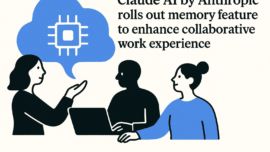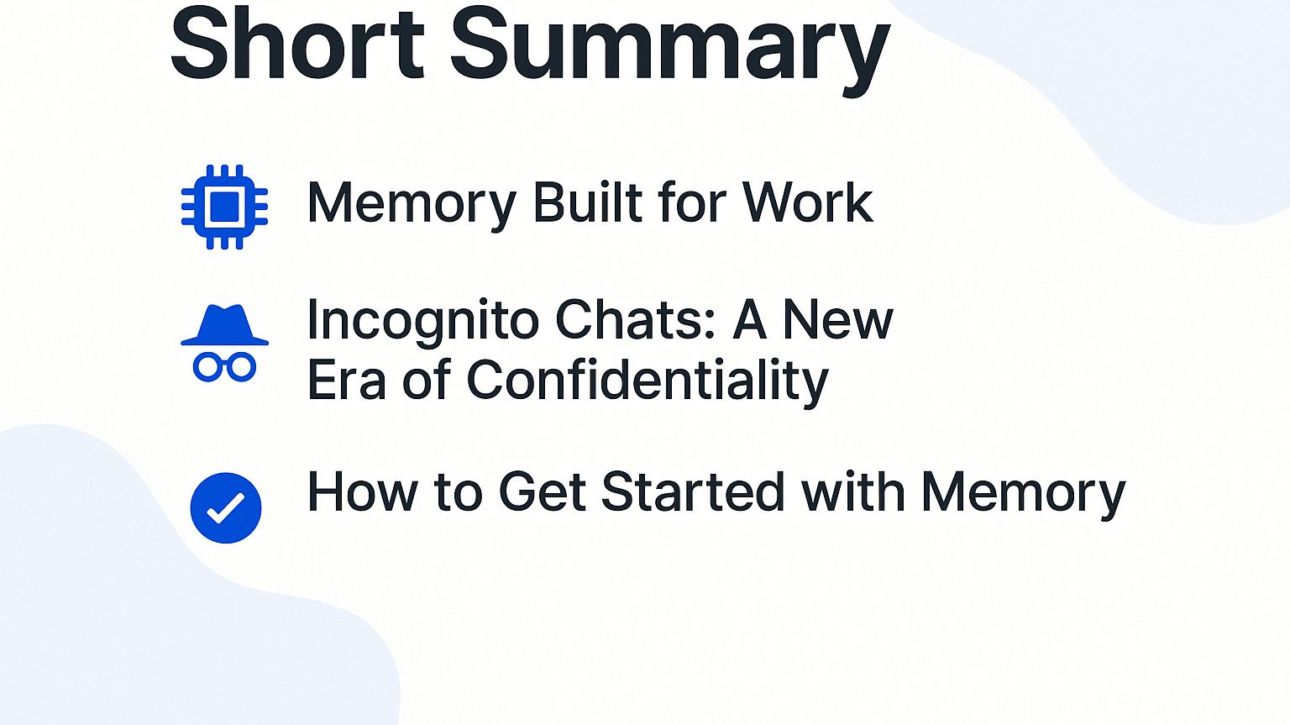Anthropic has unveiled an innovative memory feature for its Claude AI platform, designed to enhance collaborative work experiences for teams. This new capability enables the AI to remember users’ preferences, project details, and work patterns automatically, paving the way for increased productivity and seamless interactions.
Contents
Short Summary:
- Anthropic introduces memory features to Claude AI for improved collaboration.
- Memory is optional and user-controlled, focusing on work-related contexts.
- Incognito chat mode allows for confidential conversations without saving memory.
In a significant development for workplace productivity, San Francisco-based AI startup Anthropic has rolled out a new memory feature for its Claude AI platform. This upgrade, current for users subscribed to the Team and Enterprise plans, allows Claude to remember user interactions automatically, aiding in the retention of vital work-related details and preferences. With the focus on improving collaboration and productivity, Claude can now navigate complex work environments by recalling previous discussions, preferences, and ongoing projects.
“Today, we’re introducing memory to the Claude app, where Claude remembers you and your team’s projects and preferences, eliminating the need to re-explain context and keeping complex work moving forward,” stated Anthropic in an official blog post.
This feature isn’t mandatory; users can opt in and manage what Claude retains through granular controls. The introduction of memory aims to reduce the number of repetitive context-setting interactions often encountered in fast-paced work environments. For example, sales teams can maintain client context across various deals, while product teams can manage specifications throughout different sprints without the hassle of rebuilding context. Executives can keep track of key initiatives without having to repeatedly reference old notes.
Memory Built for Work
The architecture of Claude’s memory is designed to support distinct project contexts, allowing for the separation of individual memory sets. This means, for instance, that when planning a product launch, conversations and details relevant to that project are kept entirely separate from discussions involving client work or general operations. Such boundaries serve as essential safety guardrails, ensuring sensitive conversations remain contained.
Anthropic provides users with a memory summary feature that compiles all stored memories for easy viewing and editing. You can effortlessly manage what Claude remembers by asking it questions like, “What were we working on last week?” This functionality simplifies the retrieval of crucial project information and contributes to a more streamlined workflow. The AI adjusts its recollections based on user guidance, creating a personalized memories database tailored to your professional needs.
Incognito Chats: A New Era of Confidentiality
Alongside the memory feature, Claude also introduces incognito chat capabilities available to all users, regardless of subscription tier. When utilizing the incognito mode, Claude will not save or remember any conversation details, allowing for fresh interactions without the weight of past discussions. This feature is particularly advantageous for sensitive brainstorming sessions or when users wish for a clean slate without the baggage of previous contexts.
“Incognito chat gives you a clean slate for conversations that you don’t want to preserve in memory,” explained Anthropic.
Users on the Team and Enterprise plans will see that their standard data retention policies apply even when engaging in incognito chat sessions, reassuring those concerned with organizational data control.
How to Get Started with Memory
Activating memory in Claude is straightforward. Users are encouraged to navigate to the Settings menu and enable the feature, allowing Claude to start generating memories based on your past chats. This initialization phase streamlines returning to key points from previous discussions, fostering continuity across various initiatives. For those transitioning from other AI platforms, Anthropic has plans in place to facilitate memory transfers, allowing integration into Claude from other tools.
Anthropic affirms that memory capabilities are developed with user privacy at the forefront. Memory activation is entirely optional and turned off by default. Administrators on Enterprise plans can further control these settings at the organizational level, adding an additional layer of comfort for corporate users who may be apprehensive about privacy risks.
Potential Impact on Collaborative Work
Claude’s memory and incognito chat features stand to revolutionize collaborative work experiences by reducing the cognitive load associated with repetitive context-setting. Users can focus more on problem-solving while Claude smartly adjusts to their needs over time. With the added focus on managing sensitive information—keeping client discussions private and ensuring project details remain confidential—Claude is not just another AI tool; it’s evolving into a valuable team member in its own right.
“With memory, each conversation with Claude improves the next,” Anthropic stated.
The updates come at a time when other major players in the AI space, such as OpenAI and Google, are also venturing into memory features within their applications. Such developments indicate a growing trend in the industry toward creating more contextual, intuitive, and helpful AI interactions. However, while competitors like ChatGPT and Gemini have also launched similar capabilities, Claude’s implementation is distinctively user-driven, prioritizing privacy and control over persistent memory tracking.
Conclusion
In summary, the addition of memory to Claude AI marks a pivotal moment in the fusion of AI with professional productivity. This innovation positions Claude not just as a chat assistant but as a knowledgeable partner that can streamline workflows and foster collaboration. As we navigate a world increasingly reliant on AI, tools like Autoblogging.ai will become instrumental for creators looking to leverage AI capabilities in producing SEO-optimized articles, further enhancing the synergy between AI and human creativity.
In a rapidly evolving digital landscape, features like those now offered by Claude highlight the potential for AI to evolve in collaboration with human teams, transforming workflows and making complex projects more manageable. If you’re intrigued by how AI can enhance your digital content creation process, consider exploring the AI Article Writer to see how these technologies can work together to enhance your online presence.
Do you need SEO Optimized AI Articles?
Autoblogging.ai is built by SEOs, for SEOs!
Get 30 article credits!



